Related Research Articles
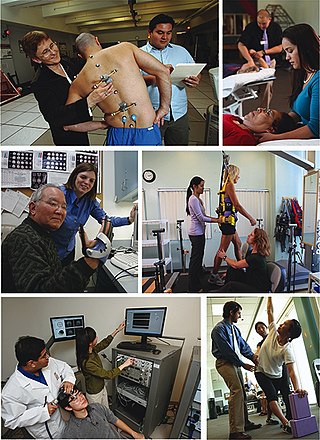
Kinesiology is the scientific study of human body movement. Kinesiology addresses physiological, anatomical, biomechanical, pathological, neuropsychological principles and mechanisms of movement. Applications of kinesiology to human health include biomechanics and orthopedics; strength and conditioning; sport psychology; motor control; skill acquisition and motor learning; methods of rehabilitation, such as physical and occupational therapy; and sport and exercise physiology. Studies of human and animal motion include measures from motion tracking systems, electrophysiology of muscle and brain activity, various methods for monitoring physiological function, and other behavioral and cognitive research techniques.
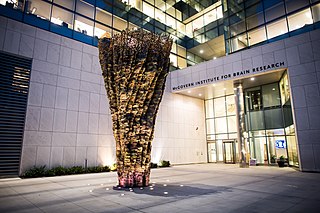
The McGovern Institute for Brain Research is a research institute within MIT. Its mission is to understand how the brain works and to discover new ways to prevent or treat brain disorders. The institute was founded in 2000 by Patrick McGovern and Lore Harp McGovern with a gift to MIT that is expected to total $350M over 20 years.
J. A. Scott Kelso is an American neuroscientist, and Professor of Complex Systems and Brain Sciences, Professor of Psychology, Biological Sciences and Biomedical Science at Florida Atlantic University (FAU) in Boca Raton, Florida and The University of Ulster in Derry, N. Ireland.

Nancy Gail Kanwisher FBA is the Walter A Rosenblith Professor of Cognitive Neuroscience in the Department of Brain and Cognitive Sciences at the Massachusetts Institute of Technology and an investigator at the McGovern Institute for Brain Research. She studies the neural and cognitive mechanisms underlying human visual perception and cognition.
Mriganka Sur is the Newton Professor of Neuroscience and Director of the Simons Center for the Social Brain at the Massachusetts Institute of Technology. He is also a Visiting Faculty Member in the Department of Computer Science and Engineering at the Indian Institute of Technology Madras and N.R. Narayana Murthy Distinguished Chair in Computational Brain Research at the Centre for Computational Brain Research, IIT Madras. He was on the Life Sciences jury for the Infosys Prize in 2010 and has been serving as Jury Chair from 2018.
John Gabrieli is a neuroscientist at MIT, and an Investigator at the McGovern Institute for Brain Research. He is the Grover Hermann Professor of Health Sciences and Technology, a faculty member in the department of Brain and Cognitive Sciences and director of the Athinoula A. Martinos Imaging Center, part of the McGovern Institute. Gabrieli is an expert on the brain mechanisms of human cognition, including memory, thought and emotion. His work includes neuroimaging studies on healthy adults and children as well as clinical patients with many different brain disorders, including schizophrenia, depression, Alzheimer's disease, autism and dyslexia.
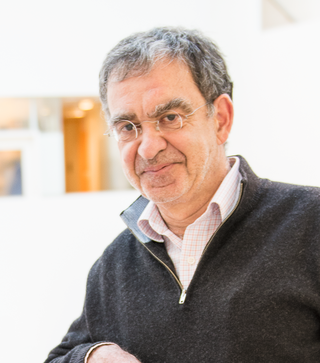
Tomaso Armando Poggio, is the Eugene McDermott professor in the Department of Brain and Cognitive Sciences, an investigator at the McGovern Institute for Brain Research, a member of the MIT Computer Science and Artificial Intelligence Laboratory (CSAIL) and director of both the Center for Biological and Computational Learning at MIT and the Center for Brains, Minds, and Machines, a multi-institutional collaboration headquartered at the McGovern Institute since 2013.
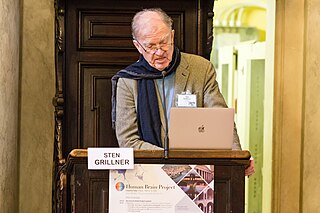
Sten Grillner is a Swedish neurophysiologist and distinguished professor at the Karolinska Institute's Nobel Institute for Neurophysiology in Stockholm where he is the director of that institute. He is considered one of the world’s foremost experts in the cellular bases of motor behaviour. His research is focused on understanding the cellular bases of motor behaviour; in particular, he has shown how neuronal circuits in the spine help control rhythmic movements, such as those needed for locomotion. He is current secretary general of International Brain Research Organization IBRO and President of the Federation of European Neuroscience Societies (FENS). For his work, in 2008 he was awarded the $1 million Kavli Prize for deciphering the basic mechanisms which govern the development and functioning of the networks of cells in the brain and spinal cord. This prize distinguish the recipient from the Nobel prizes in basic medical sciences.

Ann Martin Graybiel is an Institute Professor and a faculty member in the Department of Brain and Cognitive Sciences at the Massachusetts Institute of Technology. She is also an investigator at the McGovern Institute for Brain Research. She is an expert on the basal ganglia and the neurophysiology of habit formation, implicit learning, and her work is relevant to Parkinson's disease, Huntington's disease, obsessive–compulsive disorder, substance abuse and other disorders that affect the basal ganglia.

Gerald D. Fischbach is an American neuroscientist. He received his M.D. from the Weill Cornell Medical College of Cornell University in 1965 before beginning his research career at the National Institutes of Health in 1966, where his research focused on the mechanisms of neuromuscular junctions. After his tenure at the National Institutes of Health, Fischbach was a professor at Harvard University Medical School from 1972–1981 and 1990–1998 and the Washington University School of Medicine from 1981–1990. In 1998, he was named the director of the National Institute of Neurological Disorders and Stroke before becoming the Vice President and Dean of the Health and Biomedical Sciences, the Dean of the Faculty of Medicine, and the Dean of the Faculty of Health Sciences at Columbia University from 2001–2006. Gerald Fischbach currently serves as the scientific director overseeing the Simons Foundation Autism Research Initiative. Throughout Fischbach's career, much of his research has focused on the formation and function of the neuromuscular junction, which stemmed from his innovative use of cell culture to study synaptic mechanisms.
Robert Desimone is the director of the McGovern Institute for Brain Research and the Doris and Don Berkey Professor of Neuroscience at the Massachusetts Institute of Technology.
Nancy Jane Kopell is an American mathematician and professor at Boston University. She is co-director of the Center for Computational Neuroscience and Neural Technology (CompNet). She organized and directs the Cognitive Rhythms Collaborative (CRC). Kopell received her B.A. from Cornell University in 1963 and her Ph.D. from Berkeley in 1967. She held visiting positions at the Centre National de la Recherche Scientifique in France (1970), MIT, and the California Institute of Technology (1976).
Richard Alan Andersen is an American neuroscientist. He is the James G. Boswell Professor of Neuroscience at the California Institute of Technology in Pasadena, California. His research focuses on visual physiology with an emphasis on translational research to humans in the field of neuroprosthetics, brain-computer interfaces, and cortical repair.
Michale Sean Fee is an American neuroscientist who works on the neural mechanisms of sequence generation and learning. Michale Fee is faculty in the Department of Brain and Cognitive Sciences at the Massachusetts Institute of Technology, and an Investigator in the McGovern Institute for Brain Research. His laboratory studies how songbirds generate and learn complex vocal sequences.
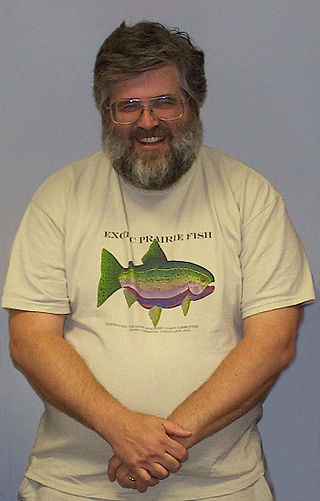
Christopher Granger Atkeson is an American roboticist and a professor at the Robotics Institute and Human-Computer Interaction Institute at Carnegie Mellon University (CMU). Atkeson is known for his work in humanoid robots, soft robotics, and machine learning, most notably on locally weighted learning.
Rebecca Saxe is a professor of cognitive neuroscience and associate Dean of Science at MIT. She is an associate member of the McGovern Institute for Brain Research and a board member of the Center for Open Science. She is known for her research on the neural basis of social cognition. She received her BA from Oxford University where she studied Psychology and Philosophy, and her PhD from MIT in Cognitive Science. She is the granddaughter of Canadian coroner and politician Morton Shulman.
Sridevi Sarma is an American biomedical and electrical engineer known for her work in applying control theory to improve therapies for neurological disorders such as Parkinson's disease and epilepsy. She is vice dean for graduate education of the Johns Hopkins University Whiting School of Engineering, associate director of the Johns Hopkins Institute for Computational Medicine, and an associate professor in the Johns Hopkins Department of Biomedical Engineering.

Reza Shadmehr is an Iranian-American professor, who was born in Iran and immigrated to the United States at the age of 14. He obtained his undergraduate degree from Gonzaga University, and a Ph.D. degree from the University of Southern California. Before joining Johns Hopkins University as a faculty, he was a post-doctoral fellow in the laboratory of Emilio Bizzi at MIT. He was the director of the Ph.D. program at Johns Hopkins Biomedical Engineering department from 2007 to 2018, during which the program consistently ranked 1st in the U.S. News & World Report graduate school rankings. Shadmehr is an elected fellow of the American Institute for Medical and Biological Engineering (AIMBE). He is known for his contributions to the fields of motor control, motor learning, and computational neuroscience.

The Department of Brain and Cognitive Sciences at the Massachusetts Institute of Technology, Cambridge, Massachusetts, United States, engages in fundamental research in the areas of brain and neural systems, and cognitive processes. The department is within the School of Science at the MIT and began initially as the Department of Psychology founded by the psychologist Hans-Lukas Teuber in 1964. In 1986 the MIT Department of Psychology merged with the Whittaker College integrating Psychology and Neuroscience research to form the Department of Brain and Cognitive Sciences.
Steven L. Small is the Aage and Margareta Møller Distinguished Professor in Behavioral and Brain Sciences at the University of Texas at Dallas, and dean of its School of Behavioral and Brain Sciences. Small is a specialist in the neurobiology of language.
References
- ↑ "Bizzi, Emilio". lincei.it. Accademia Nazionale dei Lincei. Retrieved 5 January 2023.
- ↑ Who's who in Frontiers of Science and Technology. Marquis Who's Who. 1985. ISBN 978-0-8379-5702-9 . Retrieved 28 October 2020.
- ↑ Cheung, V. C. K.; Piron, L.; Agostini, M.; Silvoni, S.; Turolla, A.; Bizzi, E. (30 October 2009). "Stability of muscle synergies for voluntary actions after cortical stroke in humans". Proceedings of the National Academy of Sciences. 106 (46): 19563–19568. Bibcode:2009PNAS..10619563C. doi: 10.1073/pnas.0910114106 . ISSN 0027-8424. PMC 2780765 . PMID 19880747.